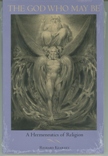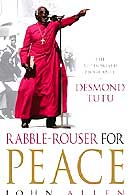[340.1]
ON NOT RESPONDING IN KIND
Having read and re-read
Terry Eagleton's
response to
Richard Dawkins'
The God Delusion several times, I still think that it's one of the better reviews that I've seen. But it doesn't really get beyond the (supposedly righteous) anger Dawkins' book flows from, and is evidently designed to illicit. Yes, it's hard for those of us with a lifetime's familiarity with theology not to feel annoyed and frustrated at the crude caricatures that the holder of the
Charles Simonyi Chair parades - not quite in the spirit of the 'public understanding' that his Oxford post is otherwise meant to uphold in the realm of science, but as part of an (over?) personal anti-religious crusade.
I came across a response to Eagleton via the rationalist site,
Butterflies and Wheels, which takes its name from an injudicious attack on Dawkins by the philosopher
Mary Midgely. She 'dismissed him back', and though she has valid things to say about his speculative shortcomings, she managed to get him rather wrong in terms of what he says about natural selection - thus opening herself up to a volley of return fire. Not much mutual listening or comprehension there. A similar pattern reproduces itself on the website, though.
B&W has some interesting stuff on it, but much of it is the kind of overconfident dissing that seems to me to be part of the problem rather than part of the solution. Plus it can be utterly self-assured (and impatient) in what it is willing to bracket as 'nonsense'. (I speak as someone who has, of course, committed these sins myself, and therefore in a repentant mode.)
Recognising that, I still thought it
might be worth trying to point out (
see comments at the end) that when Terry Eagleton uses narrative to refer to God, he isn't necessarily violating the idea that God is beyond description - since (as a life-long literary and cultural critic) he certainly understands the metaphoricity of language, and the distinction between reference and description. The bridge between these two is phenomenology, though it is a bridge which we can never actually cross, except (it could be argued) in moments of ego-displacing prayer or self-giving.
Needless to say, I didn't get anywhere. Within a certain sphere of the rationalist mindscape there is an utter determination to reduce God to a 'provable proposition', and to believe that the 'technical' language used to do this can somehow escape the anthropomorphism that is a characteristic of all language (in different ways), because it is , well, er, a human activity. This is a point
Nicholas Lash keeps coming back to in suggesting that a consciously metaphoric use of language about God (biblical imsages, say) might end up being less self-deceptive, in recognising its obvious limitations, than much apparently sophisticated 'speculative' talk which claims 'truly' to demarcate what it refers to. That is especially true for those of us who think traditional metaphysics is a dead end, incidentally, but who do not thereby abandon logic.
Anyway, although I clearly didn't get this thought recognised within the discussion (much of which remains solidly dismissive) a useful lesson was (re)learned by me in the process. Don't respond in kind, if you can help it. Unless the 'kind' involved is both illuminative and, hopefully,
kind. It's a hard lesson to take, of course; rather like acknowledging that you aren't (and shouldn't be) in charge of discourse. So, in congruence with a couple of other agendas I'm pursuing at the moment, I decided to see how I might 'take Dawkins on board' in a different sort of way - with this:
Turning God into a disaster area Nov 4, 2006; Simon Barrow says Dawkins is right to attack facile God-talk. See what you think. I probably only half-'succeeded', at best. But there I go again ;-)
Comment on this post: FaithInSociety


























